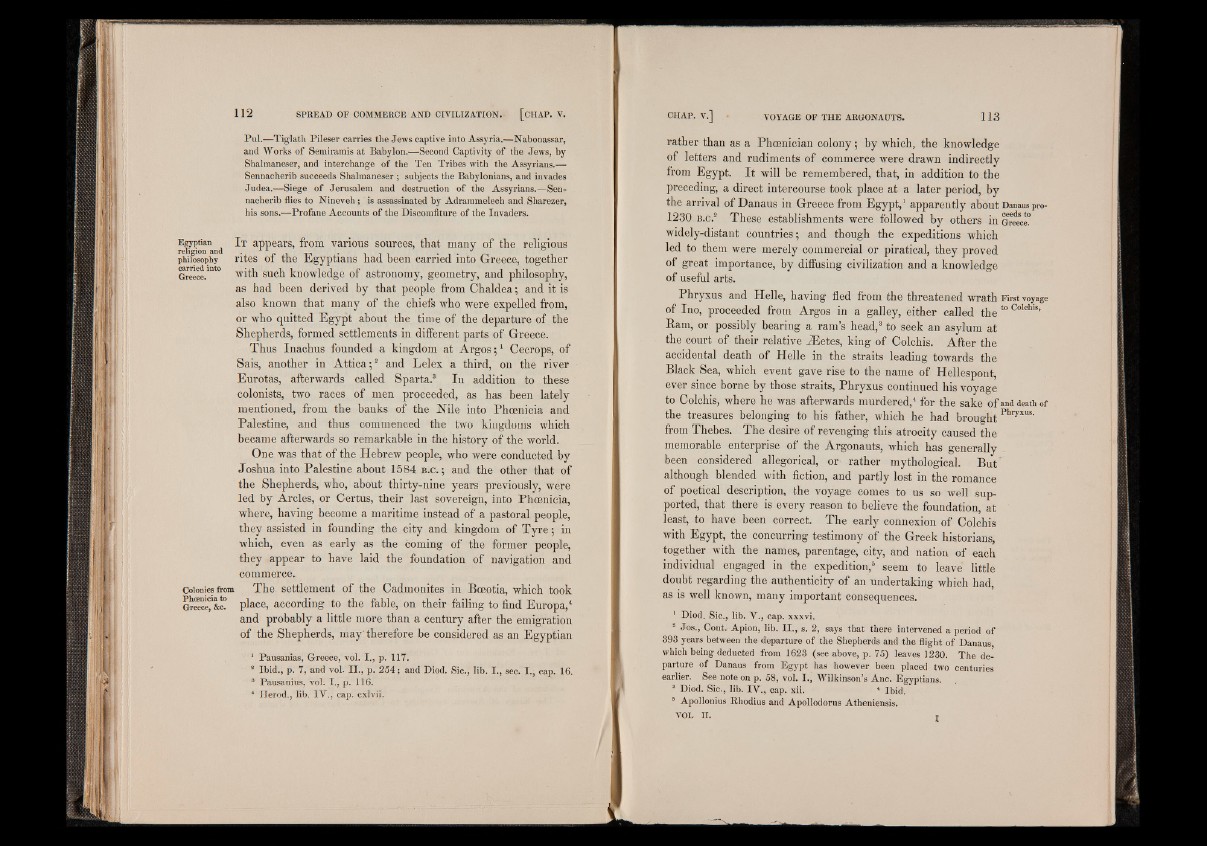
Pu l.—Tiglatli Pileser carries the Jews captive into Assyria.—Nabonassar,
and Works of Semiramis at Babylon.—Second Captivity of the Jews, by
Shalmaneser, and interchange of the Ten Tribes with the Assyrians.—
Sennacherib succeeds Shalmaneser ; subjects the Babylonians, and invades
Judea.—Siege of Jerusalem and destruction of the Assyrians.—Sennacherib
flies to Nineveh; is assassinated by Adrammelech and Sharezer,
his sons.—Profane Accounts of the Discomfiture of the Invaders.
Egyptian I t appears, from various sources, that many of the religious
religion and • p i t * • i i i i
philosophy rites ot the Ihgyptians had been carried into Greece, together
Greece.m ° vvith such knowledge of astronomy, geometry, and philosophy,
as had been derived by that people from Chaldea; and it is
also known that many of the chiefs who were expelled from,
or who quitted Egypt about the time of the departure of the
Shepherds, formed settlements in different parts of Greece.
Thus Inachus founded a kingdom at Argos; 1 Cecrops, of
Sais, another in Attica;2 and Lelex a third, on the river
Eurotas, afterwards called Sparta.3 In addition to these
colonists, two races of men proceeded, as has been lately
mentioned, from the banks of the Nile into Phoenicia and
Palestine, and thus commenced the two kingdoms which
became afterwards so remarkable in the history of the world.
One was that of the Hebrew people, who were conducted by
Joshua into Palestine about 1584 b .c . ; and the other that of
the Shepherds, who, about thirty-nine years previously, were
led by Arcles, or Certus, their last sovereign, into Phoenicia,
where, having become a maritime instead of a pastoral people,
they assisted in founding the city and kingdom of Tyre; in
which, even as early as the coming of the former people,
they appear to have laid the foundation of navigation and
commerce.
Colonies from The settlement of the Cadmonites in Boeotia, which took
GrSce^&c? place, according to the fable, on their failing to find Europa,4
and probably a little more than a century after the emigration
of the Shepherds, may' therefore be considered as an Egyptian
1 Pausanias, Greece, vol. I., p. 117.
s Ibid., p. 7, and vol. H i p. 254; and Diod. Sic., lib. I ., sec. I ., cap. 16.
3 Pausanius, vol. I., p. 116.
4 Herod., lib. IV ., cap. cxlvii.
rather than as a Phoenician colony; by which, the knowledge
of letters and rudiments of commerce were drawn indirectly
from Egypt. It will be remembered, that, in addition to the
preceding, a direct intercourse took place at a later period, by
the arrival of Danaus in Greece from Egypt,1 apparently about Danaus pro-
1230 b .c .2 These establishments were followed by others in Greece°
widely-distant countries; and though the expeditions which
led to them were merely commercial or piratical, they proved
of great importance, by diffusing civilization and a knowledge
of useful arts.
Phryxus and Helle, having fled from the threatened wrath First voyage
of Ino, proceeded from Argos in a galley, either called the to Colchls’
Bam, or possibly bearing a ram’s head,3 to seek an asylum at
the court of their relative JEetes, king of Colchis. After the
accidental death of Helle in the straits leading towards the
Black Sea, which event gave rise to the name of Hellespont,
ever since borne by those straits, Phryxus continued his voyage
to Colchis, where he was afterwards murdered,4 for the sake of and death of
the treasures belonging to his father, which he had brought Phryxus'
from Thebes. The desire of revenging this atrocity caused the
memorable enterprise of the Argonauts, which has generally
been considered allegorical, or rather mythological. But'
although blended with fiction, and partly lost in the romance
of poetical description, the voyage comes to us so well supported,
that there is every reason to believe the foundation, at
least, to have been correct. The early connexion of Colchis
with Egypt, the concurring testimony of the Greek historians,
together with the names, parentage, city, and nation of each
individual engaged in the expedition,5 seem to leave little
doubt regarding the authenticity of an undertaking which had,
as is well known, many important consequences.
1 Diod. Sic., lib. V., cap. xxxvi.
2 Jos., Cont. Apion, lib. I I ., s. 2, says that there intervened a period of
393 years between the departure of the Shepherds and the flight of Danaus
which being deducted from 1623 (see above, p. 75) leaves 1230. The departure
of Danaus from Egypt has however been placed two centuries
earlier. See note on p. 58, vol. I ., Wilkinson’s Anc. Egyptians.
8 Diod. Sic., lib. IV., cap. xii. 4 Ibid.
1 Apollonius Rhodius and Apollodorus Atheniensis.
VOL II. j